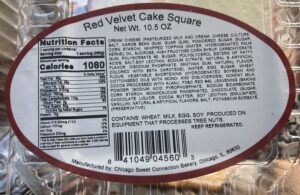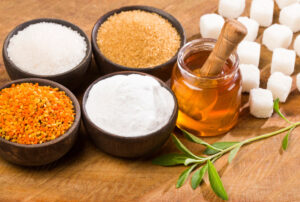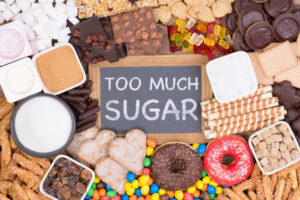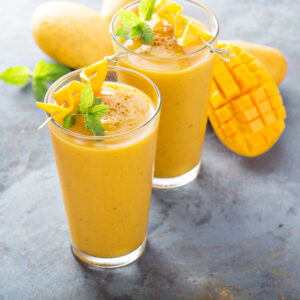The Local Mall
I visited our local mall last week for the first time in ages in order to purchase someone's favorite lotion as a birthday gift. It was a Wednesday afternoon, and I was surprised by how few people were there.
Many of the free-standing kiosks were unoccupied, but one coffee shop, staffed by a distracted teenage girl reading her phone, was open. I was about to order a cup of decaf when I happened to notice the single-serving cakes being offered in the adjoining bakery case.
Containers of Red Velvet Cake and Carrot Cake were on display, just begging me to share a few label reading tips.
Red Velvet Cake
It might be difficult to read the fine print, but here are the basics.
The Nutrition Facts box
Calories: 1080. Wowza. On a 2,000 calories-per-day eating plan, you've just consumed over half with this one treat/cheat.
Total Fat: 66 grams. The daily recommended amount is 20 grams, making this cake over 3x the recommended amount for the day.
Percentage of Fat: 55% of the calories in this cake are coming from fat. That's really high! We're aiming for 15% on a daily basis.
Saturated Fat: 28 grams. Of that 66 grams of total fat, 28 grams are saturated fat - the type that raises cholesterol, contributes to plaque buildup, and sets the stage for diabetes, dementia, and all sorts of artery-clogging ailments.
Trans Fats: 1.5 grams. This would be the hydrogenated oils listed in the ingredients list, which our own government has said there is NO safe amount. And yet here it is. Hydrogenated oils are liquid oils that have been turned into solids (shortening).
Cholesterol: 215 mg. Raises blood cholesterol and combines with saturated fat to form plaques (see above).
Sugar: 85 grams. That equates to over 21 teaspoons of sugar, all in the form of refined sugars - one of the most inflammatory foods.
Sodium: 760 mg. Again, very high! Our goal should be around 1500 mg per day, and we get about 500 mg naturally through plant foods alone. When we add in the sodium found in meats, processed meats, cheese, dairy products, and processed foods such as this cake, we're headed for trouble.
Fiber: 2 grams. A mere 2 grams of health-promoting fiber. That's because fiber, which makes us feel full, is only found in plant foods. This cake will not fill you up, by any means! We should aim for 50 grams of fiber each day (easy to do when eating plants).
The Ingredient List
Keeping in mind that ingredients are listed in order by weight, the first 3 ingredients in this cake are:
- cream cheese, powdered sugar, and whipped topping
In addition to oils and hydrogenated oils, we have high fructose corn syrup, eggs, refined wheat flour, milk, red food dye, cocoa butter, additives, preservatives, and artificial flavorings.
Every one of these ingredients contributes to inflammation!
This high-fat, high-sugar, highly processed junk food definitely needs to stay in the bakery case.
Frankenfood at its Finest
I share this not to discourage or shame anyone, but merely to motivate everyone to choose wisely!
As a nutrition educator, my goal is to inform you about about what you're ingesting into your body. How else can you make informed decisions if you're not familiar with what's in a product, including the Red Velvet Cake at the mall kiosk?
I encourage you to check out my class titled "Inflammation and Your Diet" for more details about the topic. The course does include some label reading tips as well. You'll get 50% off the class by using the coupon code TakeOff50 at the checkout.
Stay Encouraged
There are plenty of delicious, healthy cake recipes on line. Easy recipes that will satisfy your sweet tooth while not destroying your precious health. Websites I recommend include:
https://eatplant-based.com
https://shaneandsimple.com
https://annarborvegankitchen.com
https://straightupfood.com
I'd love to partner with you to help achieve your weight and health goals. Watch this free webinar, then schedule a complimentary call. No sales pitch, I promise!
Free webinar: 3 Food Mistakes that Lead to Painful Joints, Extra Pounds, and Health Problems the Doctors Aren't Solving
Signed copies of The "Plan A" Diet: click HERE





